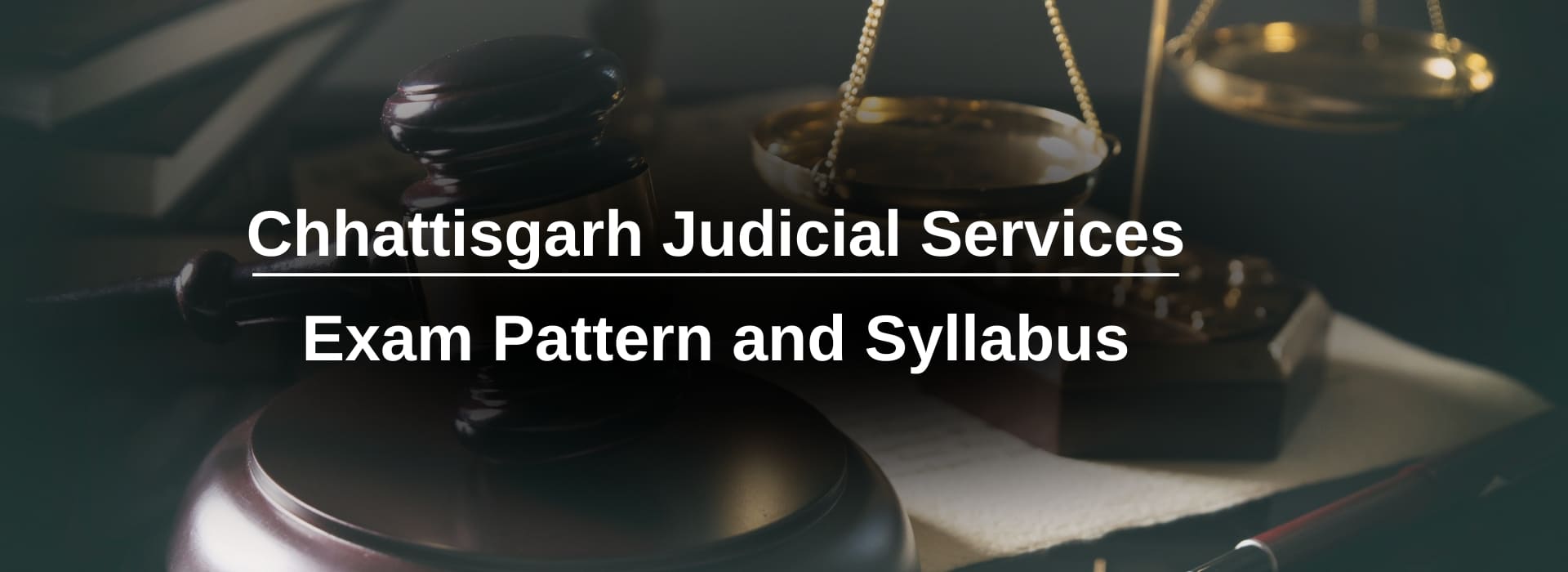
Chhattisgarh Judicial Services Exam Syllabus and Exam Pattern 2025
Introduction to Chhattisgarh Judicial Services Exam Syllabus
The Chhattisgarh Judicial Services Exam syllabus is a crucial part of your preparation for the exam. It covers essential legal topics such as criminal law, civil law, Indian Penal Code, Indian Constitution, Civil Procedure Code, Criminal Procedure Code, and more. If you're preparing for the 2025 exam, it's important to be aware of the updated syllabus following the changes announced in the official notification. This guide will help you understand the syllabus and provide the necessary information on how to plan your preparation for the Chhattisgarh Judicial Services Exam.
Overview of the Chhattisgarh Judicial Services Exam 2025
The Chhattisgarh Judicial Services Exam is conducted by the Chhattisgarh Public Service Commission (CGPSC) to recruit candidates for the position of Civil Judge. Understanding the exam syllabus is key to organizing your study plan effectively. For detailed guidance, you can download the Chhattisgarh Judicial Services Exam syllabus PDF from the official CGPSC website.
This comprehensive syllabus will guide your preparation, and we've provided a breakdown of the main subjects below.
Prelims Exam Syllabus for Chhattisgarh Judicial Services Exam 2025
The Prelims Exam syllabus has undergone some changes this year. The subjects to focus on for the Prelims are as follows:
- The Bharatiya Nyaya Sanhita, 2023
- Code of Civil Procedure
- The Bharatiya Nagarik Suraksha Sanhita, 2023
- The Bharatiya Sakshya Adhiniyam, 2023
- Constitution of India
- Transfer of Property Act
- Contract Act
- Limitation Act
- Chhattisgarh Rent Control Act, 2011
- Court Fees Act
- Specific Relief Act
- Registration Act
- Chhattisgarh Land Revenue Code
- The Negotiable Instruments Act, 1881
- Chhattisgarh Excise Act, 1915
- General Knowledge of Chhattisgarh
These topics form the foundation of the Prelims Exam. Be sure to focus on both the theory and practical application of these laws to build a strong foundation for the exam.
Chhattisgarh Judicial Services Exam Syllabus for Mains 2025
Once you clear the Prelims, the next stage is the Mains Examination. Only a select few candidates will move on to the Mains based on their performance in the Prelims, typically in a 1:10 ratio relative to the number of vacancies. The Mains Exam focuses on the following:- Framing of Issues & Judgement Writing (Civil Cases) – 40 Marks
- Framing of Charges & Judgement Writing (Criminal Cases) – 40 Marks
- Translation Test:
- English to Hindi – 10 Marks
- Hindi to English – 10 Marks
Make sure to practice framing issues, charges, and judgement writing in both civil and criminal cases. You’ll also need to work on your translation skills from English to Hindi and vice versa.
Chhattisgarh Judicial Services Exam Interview Stage
The Interview carries 15 marks, and although there’s no set syllabus for this stage, it plays a crucial role in the final selection. The interview will assess your personality, legal knowledge, and overall suitability for the role of Civil Judge. Your performance in both the Mains and Interview will determine whether you’re selected.
Chhattisgarh Judicial Services Exam Syllabus
The syllabus for the Chhattisgarh Judicial Services Exam is comprehensive and covers multiple subjects. Below is a detailed breakdown of the syllabus for both the Preliminary Exam and the Main Exam.
Tips for Preparing for the Chhattisgarh Judicial Services Exam 2025
Here are some simple tips to help you stay on track and make the most of your study time.
-
Know Your Syllabus Well: Review the entire Chhattisgarh Judicial Services Exam syllabus carefully. Focus on the core subjects like Indian Penal Code (IPC), Indian Evidence Act, and other state-specific laws.
-
Study Consistently: Break down your study into manageable sessions and stick to a daily study schedule. Consistency is key to mastering all topics.
-
Use Previous Years’ Question Papers: Practice solving previous years’ question papers to get a feel for the exam pattern and improve your time management.
-
Stay Updated on Legal Developments: Keep track of recent legal changes, rulings, and amendments, as current affairs are often included in the exam.
-
Join a Coaching Program: Consider joining a coaching institute for Judiciary Exam preparation, where experts can guide you through the syllabus and provide useful resources.
-
Focus on State-Specific Laws: Since this is the Chhattisgarh Judicial Services Exam, don’t forget to study state-specific laws like the Chhattisgarh Rent Control Act and Chhattisgarh Land Revenue Code.
By following these tips and sticking to the Chhattisgarh Judicial Services Exam syllabus, you will be well-prepared to tackle the exam and move one step closer to your goal of becoming a Civil Judge in Chhattisgarh.
Conclusion
The Chhattisgarh Judicial Services Exam is a highly competitive exam that requires dedication, consistent preparation, and a clear understanding of the law. With the right approach, focus on core subjects, and effective study strategies, you can successfully clear this exam and secure a position as a Civil Judge in Chhattisgarh.
Good luck with your preparation for the Chhattisgarh Judicial Services Exam!